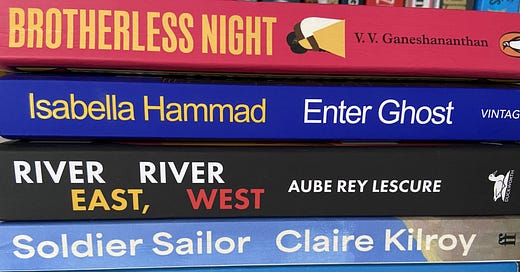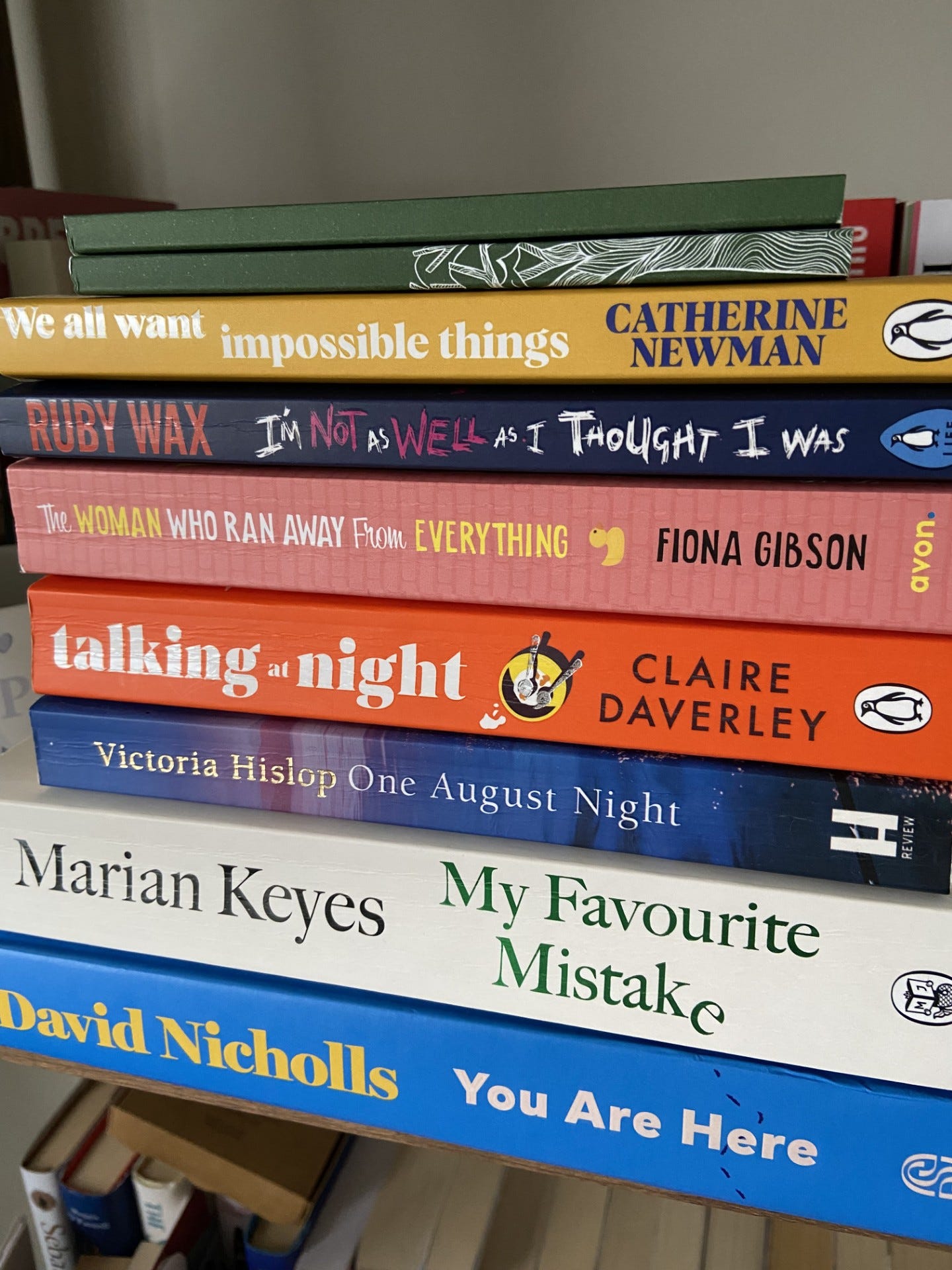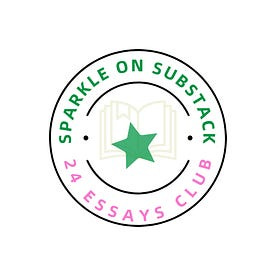My intention this summer was to read along with the Women’s Prize for Fiction shortlist. I had it all planned out. I would read and write about the six books before the winner was announced on 13 June 2024, and for a bit of fun, I would pick my winner and share it with you. I really liked the idea of pretending I was a judge on one of the most famous literary prizes in the world.
Unfortunately, life happened. When the winner was announced, I’d only read four of the books and still had two to go. What kind of judge was I? If I was doing it for real, I would have had to call Monica Ali, author and chair of the panel and give my excuses.
‘I’m sorry, Monica,’ I’d say. ‘My sister had her hen party, and it took me several weeks to recover from dancing so enthusiastically for eight hours.’
‘No problem,’ she’d say. ‘We’ll delay the greatest celebration of female creativity, just for you, shall we?’
‘Thank you, Monica. I’ll make sure my comments are insightful, profound, and worth waiting for.’
Except, when it comes to reviewing books, I’m not sure my comments are worth waiting for. I am very enthusiastic about the reads I enjoy, gushing over the ones I adore. ‘It’s brilliant,’ I’ll say. ‘Fantastic. I loved it!’ Ask me to explain my reasons on a deeper level, or to give an academic literary response, and I’ll struggle.
‘It’s beautifully written,’ I might say.
It’s not because I don’t have a brain cell in my head (I have a first-class degree in English literature), it’s just that review writing is a skill and takes a certain amount of confidence. When I read other people’s reviews—in the paper, on the internet or on social media—I’ll get review-envy and wish I could write ones so thoughtful and interesting. Instead, I offer my simple, ‘this book is amazing. Read it!’
If you want erudite, considered responses, you’re probably in the wrong place. If you want critical opinion, you are definitely in the wrong place. If you’re looking for a genuine passion for books and reading, then come on in.
So, if I was a judge on the Women’s Prize for Fiction 2024, here’s what I’d say.
I absolutely loved (and I’m gushing here) all four of the books I read. With each book, I wondered how any of the others could be any better. And then, I’d read another on the list, and the bar would move higher. It was a delightful process.
I started with Restless Dolly Maunder by Kate Grenville. This is the imagined story of Kate’s maternal grandmother.
Here’s the blurb.
“Dolly Maunder is born at the end of the 19th century, when society’s long-locked doors are just starting to creak ajar for determined women. Growing up in a poor farming family in rural New South Wales, Dolly spends her life doggedly pushing at those doors. A husband and two children do not deter her from searching for love and independence.
“Restless Dolly Maunder is a subversive, triumphant tale of a pioneering woman working her way through a world of limits and obstacles, who is able – despite the cost – to make a life she could call her own.”
I loved Dolly’s ambition and determination to do well, despite the demands and disappointments that life sends her way. I understood why she became the woman she was—the bitterness, the endless disappointment—and I understood why she became distant and ill-tempered.
At this point in my Women’s Prize judging, I took a short break to squeeze in David Nicholls’ new book, You Are Here, which I loved. Then it was back to it with The Wren, The Wren by Anne Enright.
“Nell – funny, brave and so much loved – is a young woman with adventure on her mind. As she sets out into the world, she finds her family history hard to escape. For her mother, Carmel, Nell’s leaving home opens a space in her heart, where the turmoil of a lifetime begins to churn. And across the generations falls the long shadow of Carmel’s famous father, an Irish poet of beautiful words and brutal actions.
“This is a meditation on love: spiritual, romantic, darkly sexual or genetic. A generational saga that traces the inheritance not just of trauma but also of wonder, it is a testament to the glorious resilience of women in the face of promises false and true. Above all, it is an exploration of the love between mother and daughter – sometimes fierce, often painful, but always transcendent.”
I devoured this book in a few days, mesmerised by the writing and the relationships at play. I thought it was a beautifully written and clever book, with mother-daughter relationships at its heart.
Next up was Soldier Sailor by Claire Kilroy. I loved, loved, loved this book!
‘My new favourite,’ I thought.
“In her acclaimed new novel, Claire Kilroy creates an unforgettable heroine, whose fierce love for her young son clashes with the seismic change to her own identity.
“As her marriage strains, and she struggles with questions of autonomy, creativity and the passing of time, an old friend makes a welcome return – but can he really offer her a lifeline to the woman she used to be?”
It is an intense and powerful read that captures the chaos, confusion and exhaustion of early motherhood. It made me want to read more from Claire Kilroy. This was the book I wanted to win. And then along came Brotherless Night by V. V. Ganeshananthan.
I’d read 60 pages when I turned to my husband. ‘This has to win,’ I said. ‘It’s just amazing. AMAZING!’ And I have not stopped raving about it since. It is a special book.
“This beautifully written story follows Sashi, a sixteen-year-old aspiring doctor, growing up in Jaffna in the 1980s. Her close family is torn apart by the onset of civil war. Brotherless Night vividly and compassionately centres itself around erased and marginalised stories – Tamil women, students, teachers, ordinary civilians – exploring the moral nuances of violence and terrorism against a backdrop of oppression and exile.”
I had just finished reading it when they announced it as the winner of the Women’s Prize for Fiction. I’d picked the winner! I could have been a judge, after all (if you overlooked the fact that I’d not read all the books).
The two remaining novels are Enter Ghost by Isabella Hammad and River East, River West by Aube Rey Lescure. Both sound brilliant.
Unfortunately, at this point in summer 2024, world events, events in the UK and closer to home, were unbearably upsetting and overwhelming. I didn’t feel that literary fiction was the tonic to help me cope.
Instead, I turned to some other types of books, including historical fiction, memoir, and romantic comedies.
One August Night by Victoria Hislop
A return to Spinalonga, where her best-selling debut novel, The Island, is set.
My Favourite Mistake by Marian Keyes
A great fun read – loved it, love Marian and love the Walsh sisters.
Talking at Night by Claire Daverley
I really enjoyed this one.
A Year of Nothing by Emma Gannon
Memoir. I always enjoy Emma’s writing. This is a moving account of why she had no choice but to take time away from the pressure of life and focus on appreciating the little pleasures instead.
I’m Not as Well as I Thought I Was by Ruby Wax
Memoir. Ruby makes the serious funny.
The Women Who Ran Away from Everything by Fiona Gibson
This is a lovely fun read about a middle-aged woman who runs away from her life.
We All Want Impossible Things by Catherine Newman
This is such a beautifully written book about life and loss.
It’s been a great summer of reading, and I would recommend every one of the books I’ve listed here.
As we move into autumn, I’ve promised myself that I will finish all six of the books shortlisted in the Women’s Prize for Fiction 2024. Who knows, Monica Ali might see my reviews and sign me up for next year’s judging panel.
Then again, maybe she won’t…







I’ve never really realised that review writing is a different skill. I’d love to be able to review films and books and tell the world what I think of them. The best I can do is a rating out of 10 and string together a solitary sentence!